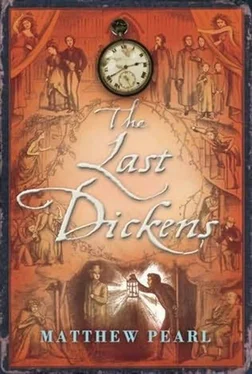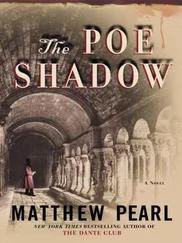Tom, in the meantime, never protested Dolby's restrictions on his duties. He was more preoccupied with the fact that Louisa Parr Barton had been allowed to walk free without questioning or a proper search of her carpetbag. At least Dickens's traveling to small, outlying towns would make it hard for the phantom incubus to follow, for she seemed a creature of the city. During Tom's duties, carrying baggage between train stations and hotels, he would keep his eyes open, which was more than anyone else was doing. He had been taught by his father in Ross that it was not the duties one was given but how one performed them that mattered.
At Syracuse, the inn was a grim place that looked like it had been built the day before, as did the whole town, and they were served what seemed like an old pig for breakfast. Henry Scott sat down in the public room and wept while George attempted to recruit an emergency militia to clean the hallway on their floor.
Between Rochester and Albany, the whole country seemed to be underwater from a furious storm that had displaced the ice and snow overnight. They had to stay all night in a desolate region that went by the name Utica. Even the telegraph poles had been knocked over and were floating like the masts from shipwrecks, so no communication was possible with the next reading hall.
Once they were near enough to Albany, they took paddleboats through the flooded expanse to get to their next hotel. Broken bridges and fences drifted across their paths alongside blocks of floating ice.
Tom was worried about Dickens as the boat struggled through. As they had crossed the United States, Tom had seen on many occasions a repetition of Dickens's sudden fits of dread while in a railway car or a ferry, or anything that the novelist had no power to stop in case of emergency. In their familiarity the fits were no longer startling but still created a distressing picture of internal terror. It was not unusual for Dickens to call out “Slower, please” to a coach driver several times until they were proceeding at the pace of a walk.
As they floated along the seemingly endless expanse of water, Dickens took out his chronometer watch to see whether they would be able to keep to their schedule. It was possible that the audience of ticket holders would not be able to reach the theater, but to Dickens that was not what was important: punctuality to him was a matter of principle and self-mastery. He shook his watch.
“It is remarkable, men,” he said. “My watch always kept perfect time and could be entirely depended upon, but since the moment of my railway calamity three years ago it has not gone quite correctly. The Staplehurst experience tells more and more, instead of less and less. There is a vague sense of dread that I have no power to check that comes and passes, but I cannot prevent its coming. Hold, what is that?” Dickens asked their guide, a superintendent of works. There was an entire train floating in the water ahead of them.
“Freight train, caught in the flood. Cattle and sheep. Men got out of it, but the livestock will have to perish, s'pose. Start eating each other in a couple of days, s'pose.”
Dickens turned to him with a hard glare.
“That's what dumb animals do, Mr. Dickens, when starved,” the superintendent continued nervously.
Dickens stared over at the abandoned train bobbing up and down in the filthy rainwater. As they passed, they could hear cries and moans from inside; it sounded like human misery. “They won't perish,” he said quietly, then moved to the head of the tiny boat. “Not a single one of them. Paddle back. That way.”
“But, sir, my instructions are strictly to get you to Albany in time for…” the guide started to protest.
“You didn't say something, did you?” Dickens asked with fire in his eyes.
“S'pose I didn't, sir,” he replied after taking a hint from the expressions of the staff in their boat.
“The Albanians can wait for us,” Dickens said. “Everyone paddle to that freight train, and no half measures! We're going to emulate Noah today!” After the work of several hours, they released the sheep and cows to swim across to land, and pulled the weaker ones up the shore high enough for them to rest until they brought food. All along, though it began to snow and hail, Dickens cheered and spurred on the men and animals with such enthusiasm that even the guide added a bounce to his step in the rescue of an emaciated calf.
Their misadventures brought them to Albany. Dickens sat before the fire at the hotel holding his hat out at the heat. It was almost a solid cake of ice, as was his beard. He tried to loosen his necktie but it was frozen into his collar.
As the new year began, most of their staff fell terribly ill. Tom was one of the few who had remained in good health, with Dickens increasingly dependent on him as the writer's own health continued to waver between hearty and weak. At one reading, ticket holders there to hear Nickleby and Mr. Bob Sawyer's Party were given notices: Mr. Charles Dickens begs indulgence for a severe cold but hopes its effects may not be perceptible after a few minutes’ reading. The first clause was composed by Dolby and a doctor; the second was the Chief's. Besides his small breakfasts, Dickens had begun limiting himself to an egg beaten up in sherry before a reading and another at intermission, which Henry would have mixed and ready in the dressing rooms.
By this time, Osgood had finished implementing his shop boy Daniel's idea of “special” condensed versions of the readings, thin volumes that Fields, Osgood & Co. sold for twenty-five cents at the front of the theaters.
“We need not worry about chasing away the Bookaneers from our readings, Mr. Branagan,” Osgood had told him when he and Fields came to see the group off at the railway station. “Mr. Sand's idea has worked exactly as we planned.”
“That lad will be on his way to clerk in no time!” Fields had said, congratulating Osgood on the innovation. “He's like another shop boy I can recall.”
On the way to Philadelphia, Tom was obliged to play cards with the Chief while Henry Scott dozed, keeping his legs locked together so that his boot would not be out at the moment some rude American spit his tobacco. Dickens, as usual when on a train, had his flask open beside him. Every few minutes, Henry's head would drop to one side and he would straighten up with great propriety as though he had been wide awake.
“No one ever likes to sleep in public like that,” Dickens said to Tom. “As a practice, I never do it myself. A contest of cribbage is good to keep you active and awake. It brings out the mettle.”
Dickens, perhaps finding Tom too quiet, seemed content to speak for both of them as they played. “How much has changed in this country it is impossible to say. The last trip I had to Philadelphia, twenty-five years ago, I remember nearly the whole city showed up at my hotel for interviews. Every Tom, Dick, Harry, and Edgar-Edgar Poe, that is. Never was a king or emperor on earth so followed by crowds as I was in Philadelphia.”
“Edgar Poe, you say, Chief?” Henry asked, his dropped head having suddenly jolted him into consciousness. The dresser was sufficiently impressed whenever he heard any person's name that he recognized as famous, especially one who had died. “Poe wrote morbid and weird tales,” Henry said as a didactic aside to Tom. “Then he died.”
“He was also a poet,” said Dickens, “as he reminded me many times. I spoke with him some about my poor raven Grip, who died eating part of our wooden stairs. We also talked about the tragic copyright situation for authors who did not reap a farthing while scoundrel publishers grew rich with spurious editions. Poe was writing tales of ‘ratiocination’ then-of mystery-as was I. Then I spoke to Poe of-yes, I can recall exactly, as if it were yesterday-of William Godwin's Caleb Williams , a work we both admired.”
Читать дальше












